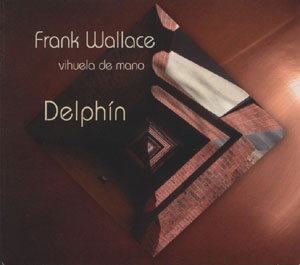 In “classical” music, recent decades have witnessed a string of revivals, from Wanda Landowska’s researches and stellar performances of music for the harpsichord and Vladimir Horowitz’s performances of Scarlatti through the burgeoning interest in plainsong and chant (including the disco versions) and the music of Hildegard of Bingen. Frank Wallace, guitarist, lutenist, baritone and composer, has concentrated on the literature of the vihuela de mano, similar in appearance and sound to a guitar but tuned like a lute and a mainstay of the courtly music of early Renaissance Spain. Because the surviving literature is scant, many performers have been deterred from exploring this instrument. Wallace has not.
In “classical” music, recent decades have witnessed a string of revivals, from Wanda Landowska’s researches and stellar performances of music for the harpsichord and Vladimir Horowitz’s performances of Scarlatti through the burgeoning interest in plainsong and chant (including the disco versions) and the music of Hildegard of Bingen. Frank Wallace, guitarist, lutenist, baritone and composer, has concentrated on the literature of the vihuela de mano, similar in appearance and sound to a guitar but tuned like a lute and a mainstay of the courtly music of early Renaissance Spain. Because the surviving literature is scant, many performers have been deterred from exploring this instrument. Wallace has not.
One thing that is immediately apparent is the origin of the style and technique that we call “Spanish” guitar – fluid, slightly melancholy, and more than a little demanding of performers. In part this is because of the introduction of polyphony (all the rage in sixteenth century Spain, as elsewhere in Europe). The demands of style and technique are amply demonstrated in Wallace’s performance of the differencias of O Gloriosa Domina by Narváez, a work demanding of both dexterity and clarity.
Wallace also includes a number of fantasias, a form that is based on the idea of “free form,” allowing for extempore performance: they are fresh and fluent, as if Wallace were composing them on the spot.
It’s very difficult to point out a particular work as being exceptional in this collection: Wallace has included thirty-five works, all short, and all fitting amazingly well our ideas of the “courtly” music of the medieval/early Renaissance era: it’s like listening to a tapestry of richly gowned ladies and unicorns, or perhaps the quieter scenes of El Cid: one can see elegant spaces filled with graceful people, the sheen of rich fabrics and the glitter of jewels. This is quiet music, a wonderful refuge for a city dweller who is a little bit tired of bustle, and superbly performed.
I can’t say that this is a collection to study, unless one is an aficionado of early music: we of the post-romantic age are too used to the flash and fire of a Beethoven or Penderecki, the towering architectural complexities of Bach or Pärt, to be stopped in our tracks by this music. I’d like to see it in a live performance, however, without the distractions of a daily life in which music is more context than event. I think it would be, in a quiet and thoroughly enjoyable way, a spellbinding evening.
(Gyre Music, 2004)
